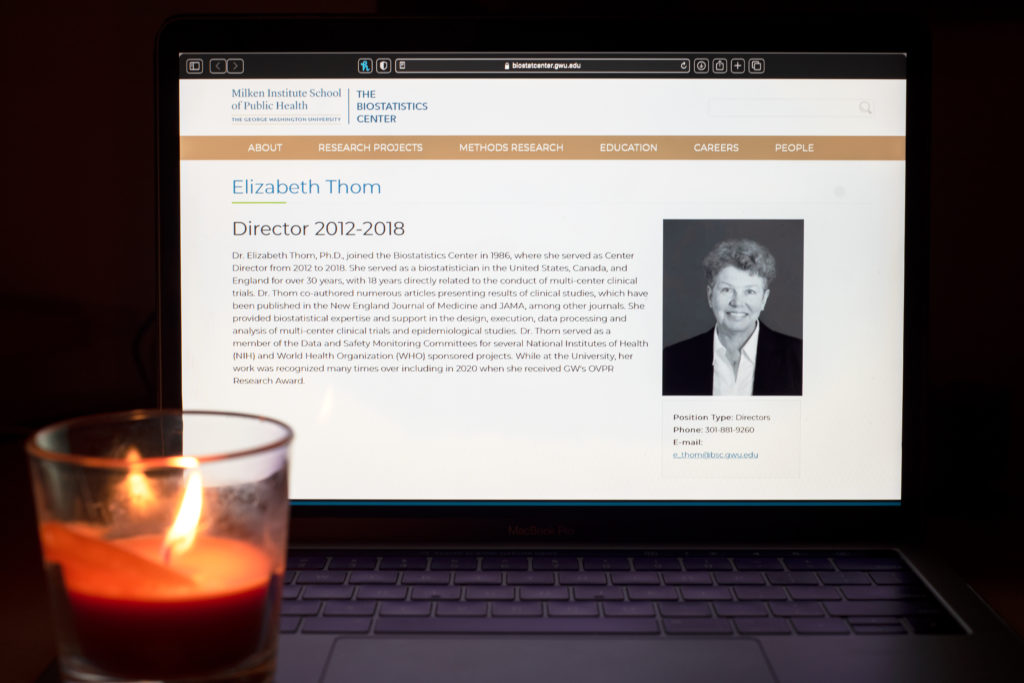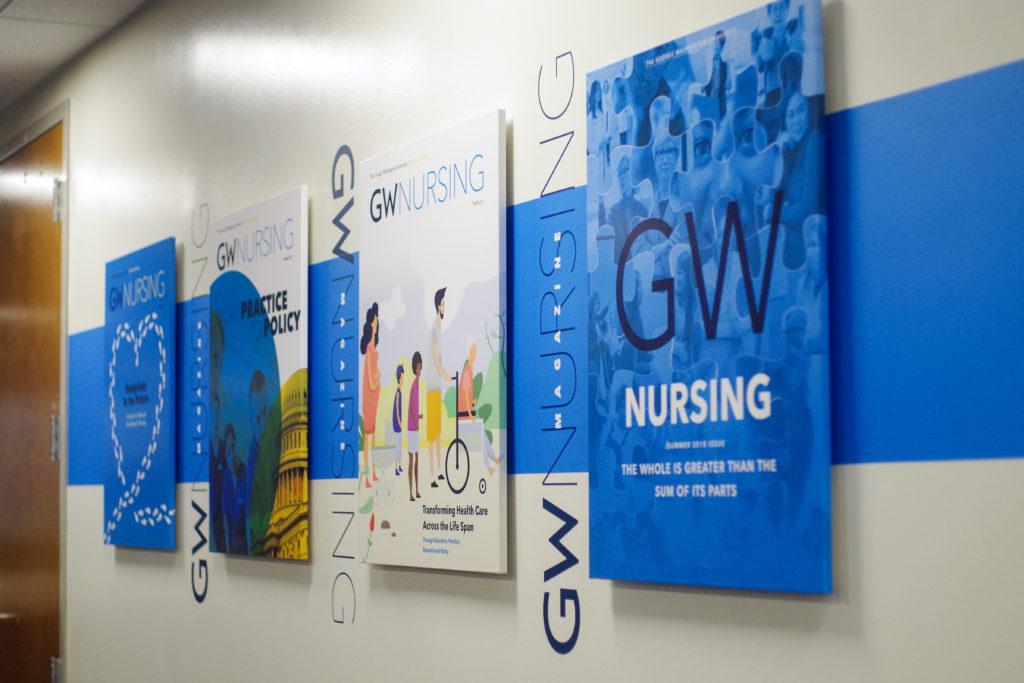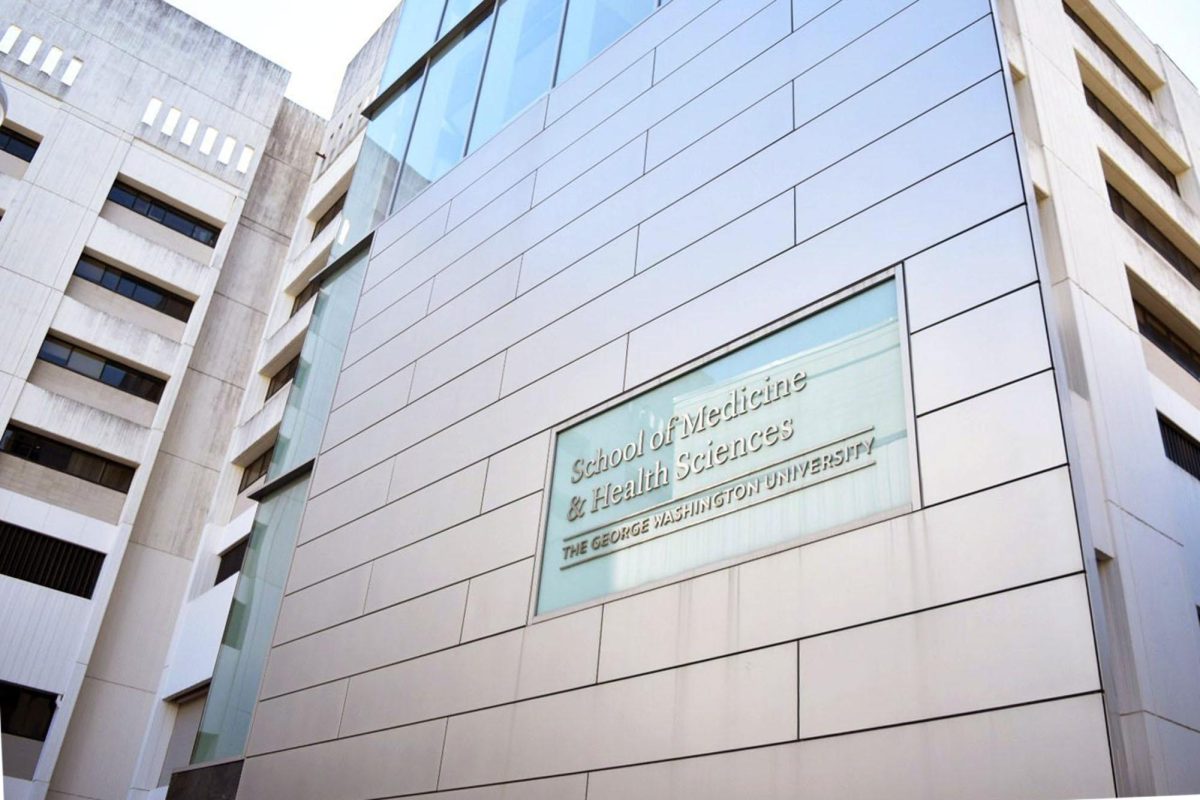Elizabeth Thom, a research professor and the former head of the Biostatistics Center, died of cancer last month, after nearly 35 years at GW. She was 72.
Colleagues and friends said Thom was an international academic leader whose “practice-changing” research on prenatal health saved “countless” lives and redefined medical practices. They said her loved ones and colleagues will remember her as humble, caring, funny and “distinctly British” for years to come.
Scott Evans, the director of the Biostatistics Center, and Trina Billinglsey, the director of administration at the Biostatistics Center, said in an email to the center’s staff that Thom was a leader at GW and her research on prenatal and motherly care helped define the industry.
“Liz was a giant in her field, internationally recognized as the pre-eminent biostatistician in maternal-fetal medicine, a distinguished researcher who contributed in immeasurable ways to the improvement of obstetric and perinatal care and to fetal diagnosis and therapy,” they said.
Thom earned her bachelor’s and master’s degrees from Oxford University and later received her Master of Science in biometry from the University of Reading in England, the email stated. Thom then joined GW’s mathematical statistics doctoral program and remained at GW for the rest of her life.
Thom joined GW’s Biostatistics Center in 1986 as a research associate, where she would spend the rest of her career, becoming the center’s associate director in 2009 and taking the center’s top job as director in 2012, according to the email. She also received her doctorate in mathematical statistics at GW in 1992 and served as the center’s director until 2018 when she rejoined the University’s faculty.
Officials said Thom served as the principal investigator for the Maternal Fetal Medicine Units Network of the Eunice Kennedy Shriver National Institute of Child Health and Human Development, which conducts clinical research into obstetrics and maternal-fetal medicine. During her time as principal investigator she authored 114 publications and brought in nearly $200 million in research funding to the center, the email stated.
George Saade, a professor of obstetrics and gynecology at the University of Texas Medical Branch at Galveston, said Thom earned numerous accolades throughout her career and was the “secret ingredient” that improved the lives of the people around her.
“The passing of Professor Thom will be felt throughout women’s health,” he said in an email. “In her several decades at GW, she was responsible for some of the seminal studies that changed how we practice medicine and improved the lives of countless mothers and babies all over the world.”
John Lachin, a research professor of biostatistics, bioinformatics and statistics, said Thom was nationally recognized by the the National Institutes of Health for clinical research and for her statistical and medical leadership. Lachin said he will most miss Thom’s smile and “delightful British accent.”
Faculty said Thom showed her “distinctly British” personality through her dry sense of humor and humble character.
Billingsley, the director of administration for the Biostatistics Center, said Thom was modest about her achievements in medicine and “was never one to draw attention to herself.” She said she will most miss their routine conversations about Britain.
“Personally, I will miss our conversations about England and her cottage in a small English village, the latest British TV shows and British culture,” she said in an email.
William Rosenberger, a professor of statistics at George Mason University, said he and Thom both received their doctorates in mathematical statistics from GW in 1992, and she was always considered “the brilliant one” in class.
“She took a First in Mathematics from Oxford if I remember correctly,” he said. “Her thesis was on probabilistic properties of survival models for clinical trials.”
Faculty also remembered her endearing personality and strong leadership qualities that made her colleagues look up to her.
Homa Ahmadzia, an assistant professor of obstetrics and gynecology, said while she was a maternal-fetal medicine fellow she thought of Thom as “approachable and warm.” She said Thom excelled while mentoring the faculty who joined the center over the years.
“She thrived on mentoring junior investigators and fostering a sense of rigorous clinical trial study design with her tremendous experience,” she said.
Naji Younes, an associate research professor of biostatistics, said he never worked directly with Thom, but he was able to get to know her through meetings, dissertation defenses and office holiday parties. Younes said Thom was wise, and he turned to her for advice multiple times throughout his time at GW.
He said she never failed to show kindness or give him words of encouragement.
“She was an amazing person who made the world a better place through her work and had a deep impact on those who knew her,” he said in an email. “It’s hard to accept that she’s no longer with us.”
Diane Uschner, an assistant professor of biostatistics and bioinformatics, said Thom would leave behind a “tremendous legacy” that will live on through her work and loved ones.
“Liz was a guide post and endless well of experience,” she said. “She always had some advice to share. People would say ‘Liz will know about this.’”
Mimi Ghosh, an associate professor of epidemiology, said Thom made statistics fun with quirky posters and an approachable and caring attitude. She said she inspired young faculty at the center and left behind a legacy for future faculty and staff.
“Her legacy is so powerful that we all felt incredibly touched by her and even guarded by her in a lot of ways,” Ghosh said.











